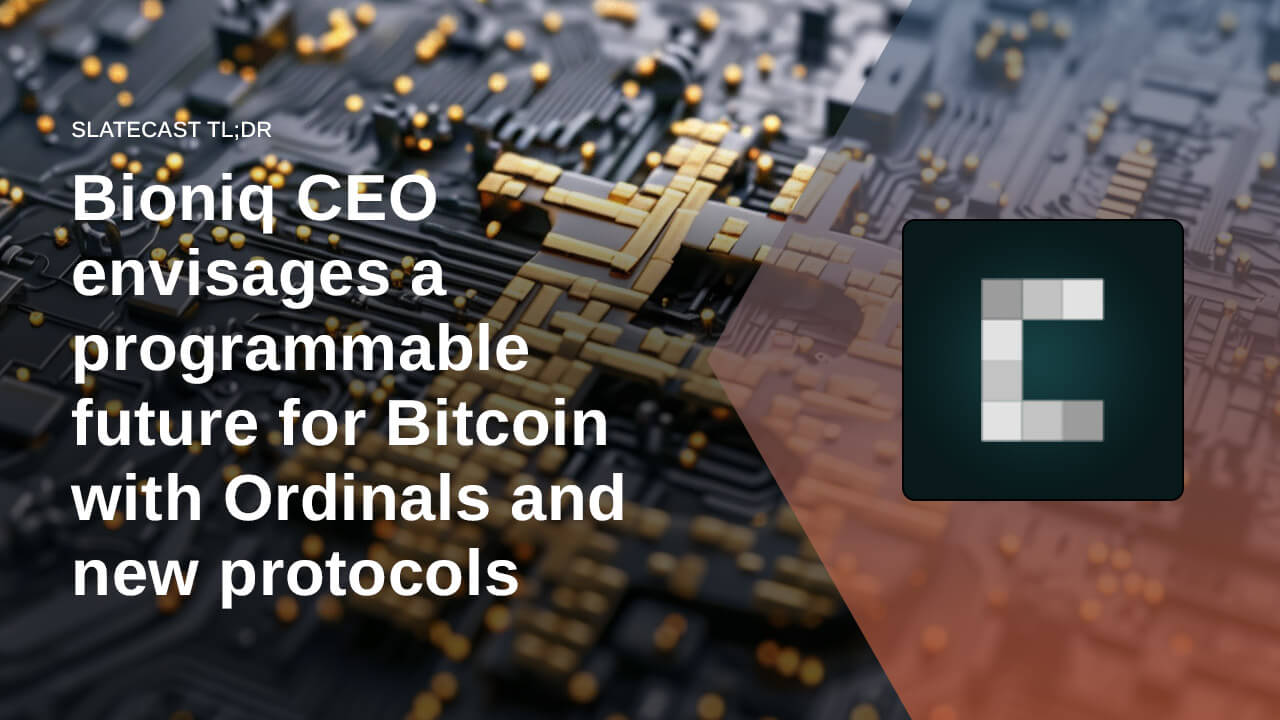[ad_1]

In the latest episode of the SlateCast, Liam “Akiba” Wright and Nate Whitehill welcomed Bob Bodily, the CEO and co-founder of Bioniq, to discuss the future of Ordinals, the programmability of Bitcoin, and the potential impact of these developments on the broader crypto ecosystem.
Bodily, a passionate advocate for the decentralized and permissionless nature of Bitcoin, shared his insights on the ongoing debates around Ordinals and the challenges and opportunities they present.
The Runes Craze and Bitcoin’s Narrative
The discussion started with a deep dive into the Runes craze, a recent phenomenon that recorded the highest transaction fees on the Bitcoin network.
Bodily acknowledged the hype surrounding Runes, describing it as a “fungible token protocol on Bitcoin” that initially sparked inflated expectations, only to be met with some disillusionment as users grappled with the realities of minting and trading experiences.
Defending Ordinals and Bitcoin’s Permissionless Nature
When confronted with philosophical objections to Ordinals, suggesting they go against Satoshi’s vision of Bitcoin as peer-to-peer cash, Bodily stood firmly behind the permissionless and censorship-resistant nature of Bitcoin. He argued:
“When you have something that’s permissionless and censorship-resistant, then who is, I don’t know, who has the right to tell you what you can or can’t do on Bitcoin?”
Bodily highlighted the renewed interest and excitement surrounding Bitcoin, with venture capital firms investing, builders returning to the ecosystem, and innovative projects emerging, all fueled by the increased possibilities enabled by Ordinals.
“We have people fighting to upgrade Bitcoin. We have L2s being built on Bitcoin and take all of that interest and excitement. And it’s just good for Bitcoin,” Bodily stated.
The Potential for Bitcoin’s Programmability
Addressing the potential for Bitcoin to become more programmable, Bodily painted a speculative picture of a future where everything done on other blockchains finds its way to Bitcoin. He envisioned a flourishing ecosystem where Bitcoin serves as “the world’s most decentralized database,” enabling lending platforms, NFT marketplaces, DeFi protocols, and more.
“If I had to paint a picture, it’s everything that you’ve seen on Ethereum with like DeFi Summer, with NFT Summer. We’re already starting to see that on Bitcoin,” Bodily remarked.
The Bioniq Ecosystem and Future Plans
Bodily also touched on Bioniq’s ecosystem, which was built on the Internet Computer (ICP) as a Bitcoin sidechain. He highlighted the advantages of this choice, including seamless Bitcoin integration, the ability for smart contracts to hold and manage Bitcoin transactions directly, and the potential for an L2 Ordinals marketplace with faster transactions and lower fees.
Looking ahead, Bodily teased plans for Bioniq, including a launchpad, collateralized lending for Ordinals, and staking games incorporating Ordinals, BRC20, and Runes. These developments aim to expand Bioniq’s addressable market and, more broadly, drive adoption for Bitcoin NFTs.
As the conversation drew to a close, Bodily’s enthusiasm for the future of Bitcoin and its potential for programmability was palpable. While acknowledging the challenges and risks associated with upgrades and centralization, he remained optimistic about the decentralized approach to scaling Bitcoin and the community’s innovative solutions.
With Ordinals and projects like Bioniq at the forefront, the future of Bitcoin appears to be one of increased utility, programmability, and adoption while maintaining its core principles of decentralization and permissionlessness.
🎙️ New SlateCast: Expanding #Bitcoin Metaprotocols
“We’re getting a lower and lower block subsidy, and we need sustainable fee revenue for miners.
This is perhaps the best solution that we’ve ever seen for that particular problem.”
🎤 Guest: @BobBodily from @bioniqMarket
🗣️… pic.twitter.com/9izreE6vWv— CryptoSlate (@CryptoSlate) April 24, 2024
[ad_2]
Source link
